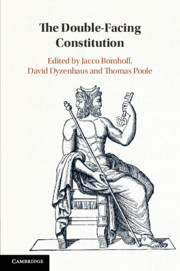Book contents
- The Double-Facing Constitution
- The Double-Facing Constitution
- Copyright page
- Contents
- Contributors
- 1 Introduction
- Part I Theoretical Foundations
- Part II Border Crossings: Comity and Mobility
- Part III The Foreign in Foreign Relations Law
- 11 Double-Facing Administrative Law: State Prerogatives, Cities and Foreign Affairs
- 12 The Democratic Challenge to Foreign Relations Law in Transatlantic Perspective
- 13 The Double-Facing Foreign Relations Function of the Executive and Its Self-Enforcing Obligation to Comply with International Law
- 14 The Various Faces of Fundamental Rights
- Index
13 - The Double-Facing Foreign Relations Function of the Executive and Its Self-Enforcing Obligation to Comply with International Law
from Part III - The Foreign in Foreign Relations Law
Published online by Cambridge University Press: 17 January 2020
- The Double-Facing Constitution
- The Double-Facing Constitution
- Copyright page
- Contents
- Contributors
- 1 Introduction
- Part I Theoretical Foundations
- Part II Border Crossings: Comity and Mobility
- Part III The Foreign in Foreign Relations Law
- 11 Double-Facing Administrative Law: State Prerogatives, Cities and Foreign Affairs
- 12 The Democratic Challenge to Foreign Relations Law in Transatlantic Perspective
- 13 The Double-Facing Foreign Relations Function of the Executive and Its Self-Enforcing Obligation to Comply with International Law
- 14 The Various Faces of Fundamental Rights
- Index
Summary
Campbell McLachlan’s starting point is what he calls ‘a neglected question that is central to an understanding of the operation of the ‘double-facing constitution’ in a dualist state’ – meaning a state, like the United Kingdom, where domestic law and international law are thought of as operating on separate planes. The question is this: ‘If the Constitution grants sovereign law-making power within the state to Parliament, and at the same time allocates the conduct of foreign relations to the executive, to what extent and, if so why, is the executive bound to comply with international law obligations that it has contracted on behalf of the state, but which have not been directly incorporated into domestic law?’ Using a case study of the history of advice on international law provided by the law officers of the Crown and on recent changes to the wording of the Ministerial Code in the United Kingdom, McLachlan argues that ministers are, and have long been, bound to comply with international legal norms. But he also shows that the content of this obligation to comply has to be clearly distinguished from the question of justiciability, or review by courts. Ultimately, McLachlan’s chapter offers a revealing discussion of the intricate ‘domestic’ workings of foreign relations law, and an argument for and understanding of the relationship between prerogative powers and constitutional obligations that advances the rule of law.
Keywords
- Type
- Chapter
- Information
- The Double-Facing Constitution , pp. 376 - 412Publisher: Cambridge University PressPrint publication year: 2020

